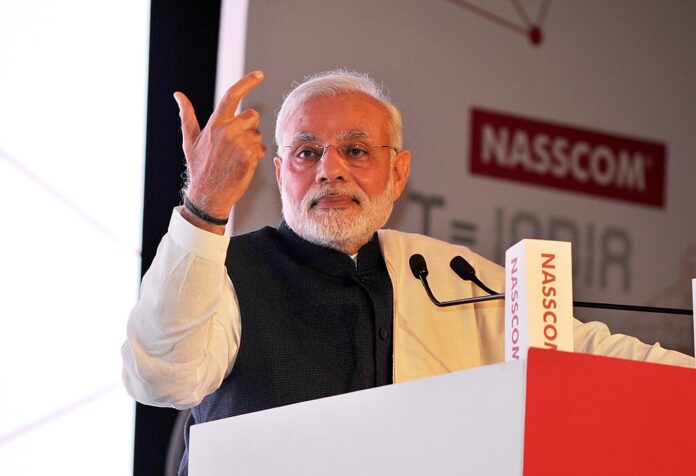Modi forms coalition government after losing outright majority in elections
Narendra Modi has been sworn in as India’s prime minister for a third term after a surprising election result that saw his Bharatiya Janata Party (BJP) lose its outright majority. President Droupadi Murmu administered the oath of office to Modi on Sunday at the Rashtrapati Bhavan in New Delhi. The ceremony, attended by thousands of dignitaries, including leaders from neighbouring countries, Bollywood stars, and industrialists, marked a significant moment in India’s political landscape.
Modi, dressed in a white kurta and blue half jacket, received enthusiastic cheers from supporters who chanted his name as he took his oath. “Honoured to serve Bharat,” Modi posted on X (formerly Twitter), moments before the ceremony, reflecting his commitment to the nation. Following his swearing-in, Modi vowed to protect India’s constitution, surrounded by officials from the BJP and leaders of his coalition partners.
Senior ministers from the previous government, including Rajnath Singh, Amit Shah, Nitin Gadkari, Nirmala Sitharaman, Subrahmanyam Jaishankar, and Piyush Goyal, also took their oaths. Their specific portfolios are yet to be announced, but their presence indicates continuity in key areas of governance.
Modi’s political journey began with the Hindu nationalist Rashtriya Swayamsevak Sangh (RSS), the ideological parent of the BJP. He is now the second leader after Jawaharlal Nehru to serve three consecutive terms as prime minister. Modi’s third term comes after a multi-stage election process that concluded on June 1, supported by 14 regional parties within the BJP-led National Democratic Alliance (NDA).
Despite the united front presented by the coalition, political analysts foresee potential challenges. Zoya Hasan, a political analyst from Jawaharlal Nehru University, notes that Modi’s new coalition partners, including Chandrababu Naidu and Nitish Kumar, are seasoned politicians who may challenge the BJP’s nationalist agenda. Hasan suggests that these alliances could lead to friction, especially as the opposition seeks to woo these influential allies.
Economically, Modi faces significant pressure to address India’s growing economic disparity. The country’s economy grew by 8.2 per cent in the last fiscal year, one of the fastest rates among major economies. However, domestic issues such as job shortages, high prices, low incomes, and religious tensions influenced voters’ decisions. Modi has acknowledged the middle class as the driving force of the country and pledged to focus on increasing their savings, improving their quality of life, and adjusting policies to better support them.
In his previous terms, Modi’s administration was marked by significant reforms and initiatives aimed at transforming India’s infrastructure and economy. However, the current coalition government presents a new dynamic that will require careful navigation to maintain policy certainty and political stability. The diverse interests of coalition partners will test Modi’s ability to lead effectively while managing differing agendas.
The swearing-in ceremony highlighted India’s vibrant democracy, with a diverse array of attendees reflecting the country’s multifaceted society. As Modi embarks on his third term, the focus will be on how he addresses the economic and social challenges facing India, while maintaining the support of his coalition partners.
India’s political landscape is poised for an interesting phase as Modi’s administration navigates the complexities of coalition governance. The coming years will reveal how effectively Modi can implement his vision for India, ensuring growth and stability in the world’s most populous nation.
Analysis:
Narendra Modi’s third term as India’s prime minister marks a significant juncture in the country’s political trajectory. Politically, the formation of a coalition government introduces a new layer of complexity. The BJP, having lost its outright majority, must now rely on the support of 14 regional parties within the NDA. This coalition dynamic may lead to policy negotiations and compromises, testing Modi’s leadership and strategic acumen. The involvement of experienced politicians like Chandrababu Naidu and Nitish Kumar suggests the potential for both collaboration and conflict, given their divergent political agendas.
Economically, India faces the dual challenge of sustaining high growth rates while addressing domestic issues such as job shortages, inflation, and income disparity. Modi’s previous terms saw ambitious economic reforms, but the new coalition government’s varied interests might slow the pace of such initiatives. Ensuring economic stability and equitable growth will be crucial, especially with the middle class’s expectations and the economic impacts of global uncertainties.
From a sociological perspective, Modi’s administration must navigate India’s diverse social fabric. Religious tensions and cultural divisions have been prominent issues, and maintaining social harmony will be vital. The coalition government includes parties with different ideological stances, which may influence policies on social issues. Modi’s emphasis on protecting the constitution highlights a commitment to democratic principles, but practical implementation will require balancing coalition partners’ interests.
Gender perspectives in Modi’s governance have seen mixed results. While initiatives like the Beti Bachao Beti Padhao campaign aimed to improve the status of women, challenges such as gender-based violence and inequality persist. The new government’s composition and policy focus will impact progress in gender equality and women’s empowerment. Ensuring that coalition agreements support gender-inclusive policies will be essential.
Locally, the impact of Modi’s third term will vary across India’s states and regions. The coalition includes regional parties with strong local influences, which could lead to tailored policies addressing regional needs. This localized approach may benefit areas with specific economic or social challenges, but it also requires effective coordination among diverse political entities.
Theoretically, the coalition government reflects the principles of pluralism and coalition politics, where governance involves negotiation and compromise among various political actors. This scenario underscores the importance of consensus-building and collaborative leadership. Modi’s ability to manage this coalition will be a test of his political skills and adaptability.
In conclusion, Narendra Modi’s third term as prime minister presents both opportunities and challenges. The coalition government necessitates strategic navigation of political alliances, economic management, and social harmony. Modi’s leadership will be pivotal in steering India through this complex landscape, ensuring that the country’s growth and stability are maintained while addressing the diverse needs of its population.
